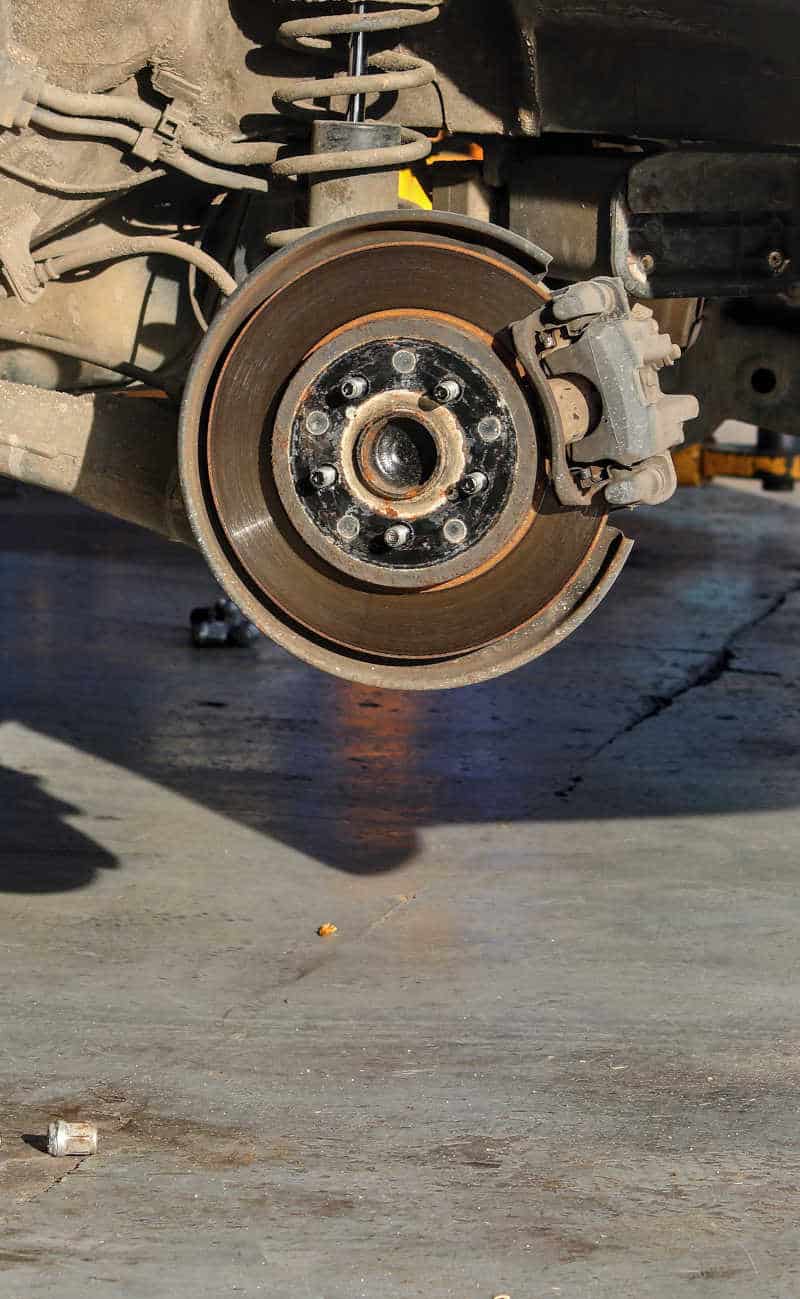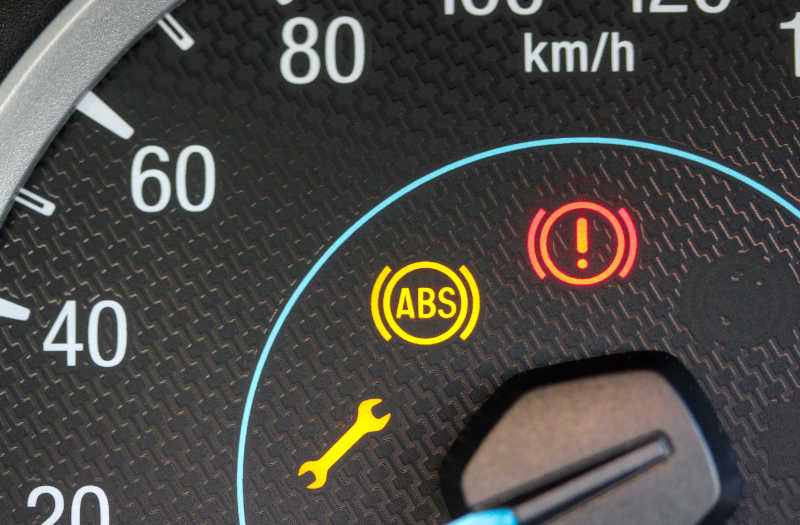Your brakes protect you and everyone on the road. Yet drivers often postpone maintenance. According to the National Highway Traffic Safety Administration (NHTSA), brake issues cause 22% of accidents from mechanical failures each year.
Brake care is critical in Chicago. Winter weather, road salt, and potholes quickly wear brakes, increasing failure risks. Knowing these five brake warning signs can save money and lives.
Your brakes protect you and everyone on the road. Yet drivers often postpone maintenance. According to the National Highway Traffic Safety Administration (NHTSA), brake issues cause 22% of accidents from mechanical failures each year.
Brake care is critical in Chicago. Winter weather, road salt, and potholes quickly wear brakes, increasing failure risks. Knowing these five brake warning signs can save money and lives.
Squeling or Grinding Noises
Squealing or grinding noises usually mean worn brake pads or rotor damage. Ignoring these sounds reduces safety and raises repair costs.
Expert Mechanic says:
“Grinding noises mean your brake pads are gone. Ignoring them risks safety and triples repair expenses.”
Chicago’s winter salt and road conditions speed brake wear.

Squealing or grinding noises usually mean worn brake pads or rotor damage. Ignoring these sounds reduces safety and raises repair costs.
Expert Mechanic says:
“Grinding noises mean your brake pads are gone. Ignoring them risks safety and triples repair expenses.”
Chicago’s winter salt and road conditions speed brake wear.
Squeling or Grinding Noises

Brake Warning Lights on Your Dashboard
Dashboard brake lights warn you about ABS issues, brake fluid levels, or system failures. Ignoring these lights can cause expensive repairs or dangerous accidents.
AAA reports that nearly 1 in 4 drivers ignore dashboard warnings, increasing vehicle damage risks.
In Chicago, extreme cold causes brake fluid and ABS sensor problems. Don’t ignore dashboard alerts—get your brakes inspected promptly.
Dashboard brake lights warn you about ABS issues, brake fluid levels, or system failures. Ignoring these lights can cause expensive repairs or dangerous accidents.
AAA reports that nearly 1 in 4 drivers ignore dashboard warnings, increasing vehicle damage risks.
In Chicago, extreme cold causes brake fluid and ABS sensor problems. Don’t ignore dashboard alerts—get your brakes inspected promptly.
Soft or Spongy Brake Pedal
A soft or spongy brake pedal usually means there’s air in the brake lines or a brake fluid leak. When you press the pedal, it should feel firm and responsive. If it sinks too easily or feels squishy, your braking power may be compromised.
That’s more than just a comfort issue—it’s a serious safety risk. In a sudden stop, especially on slick Chicago streets, a delayed brake response can be the difference between stopping safely or not stopping at all.
Expert Quote:
“A spongy pedal might seem minor, but it’s often the first sign your brake system isn’t holding pressure. That’s not something you want to find out the hard way.” — Certified Technician, Pulaski Automotive
Chicago-Specific Note:
Cold weather and corrosion from road salt can weaken brake lines, making this problem more common in winter months. If your pedal doesn’t feel right, don’t wait.
Car Pulling to One Side When Braking
If your car veers left or right when you brake, that’s not just annoying—it’s a red flag. Uneven brake pad wear, a stuck caliper, or brake fluid imbalance could be the cause. It may also be confused with alignment or tire issues, but if the pulling only happens during braking, it’s likely your brakes.
Driving in Chicago makes this issue worse. Potholes, slush, and salted streets can damage calipers or throw your brake system out of balance. When your car doesn’t brake straight, it compromises control—especially dangerous in emergency situations or during icy weather.
Data Point:
According to the Insurance Institute for Highway Safety (IIHS), loss of vehicle control is a leading factor in winter weather collisions. Proper brake balance is key to avoiding that.
Quick Tip:
If you notice your car pulling while braking, get it checked immediately. Delaying could lead to uneven tire wear or more expensive repairs.
Soft or Spongy Brake Pedal
A soft or spongy brake pedal usually means there’s air in the brake lines or a brake fluid leak. When you press the pedal, it should feel firm and responsive. If it sinks too easily or feels squishy, your braking power may be compromised.
That’s more than just a comfort issue—it’s a serious safety risk. In a sudden stop, especially on slick Chicago streets, a delayed brake response can be the difference between stopping safely or not stopping at all.
Expert Quote:
“A spongy pedal might seem minor, but it’s often the first sign your brake system isn’t holding pressure. That’s not something you want to find out the hard way.” — Certified Technician, Pulaski Automotive
Chicago-Specific Note:
Cold weather and corrosion from road salt can weaken brake lines, making this problem more common in winter months. If your pedal doesn’t feel right, don’t wait.
Car Pulling to One Side When Braking
If your car veers left or right when you brake, that’s not just annoying—it’s a red flag. Uneven brake pad wear, a stuck caliper, or brake fluid imbalance could be the cause. It may also be confused with alignment or tire issues, but if the pulling only happens during braking, it’s likely your brakes.
Driving in Chicago makes this issue worse. Potholes, slush, and salted streets can damage calipers or throw your brake system out of balance. When your car doesn’t brake straight, it compromises control—especially dangerous in emergency situations or during icy weather.
Data Point:
According to the Insurance Institute for Highway Safety (IIHS), loss of vehicle control is a leading factor in winter weather collisions. Proper brake balance is key to avoiding that.
Quick Tip:
If you notice your car pulling while braking, get it checked immediately. Delaying could lead to uneven tire wear or more expensive repairs.
Excessive Vibration or Shaking When Braking
Vibrations in your steering wheel or brake pedal during braking often signal warped brake rotors. This can happen from excessive heat, hard braking, or general wear and tear. If ignored, warped rotors reduce stopping power and cause faster pad wear.
Why It Matters:
This problem doesn’t just affect comfort—it affects safety. Vibrations reduce your ability to brake smoothly and extend your stopping distance, especially at high speeds.

Expert Quote:
“When you feel shaking during braking, your rotors are likely warped. Keep driving like that, and you’ll wear out your pads faster and risk brake failure.” — Pulaski Automotive Technician
Chicago-Specific Note:
Constant stop-and-go traffic and harsh road surfaces in Chicago can contribute to rotor damage. Add salt and winter grime, and your braking components take a beating.
Fix It Fast:
Warped rotors should be resurfaced or replaced. Letting it go will only cost more down the road.
Vibrations in your steering wheel or brake pedal during braking often signal warped brake rotors. This can happen from excessive heat, hard braking, or general wear and tear. If ignored, warped rotors reduce stopping power and cause faster pad wear.
Why It Matters:
This problem doesn’t just affect comfort—it affects safety. Vibrations reduce your ability to brake smoothly and extend your stopping distance, especially at high speeds.
Excessive Vibration or Shaking When Braking

Expert Quote:
“When you feel shaking during braking, your rotors are likely warped. Keep driving like that, and you’ll wear out your pads faster and risk brake failure.” — Pulaski Automotive Technician
Chicago-Specific Note:
Constant stop-and-go traffic and harsh road surfaces in Chicago can contribute to rotor damage. Add salt and winter grime, and your braking components take a beating.
Fix It Fast:
Warped rotors should be resurfaced or replaced. Letting it go will only cost more down the road.
How Often Should Chicago Drivers Check Brakes?
Brake maintenance isn’t something you should leave to chance—especially in Chicago. The city’s rough roads, frequent stop-and-go traffic, and long winters mean your brakes work harder than they would in many other places. Salt, slush, and cold temperatures accelerate corrosion in brake lines, rotors, and pads. That’s why routine brake inspections are a must.
The Chicago Automobile Trade Association (CATA) recommends having your brakes professionally inspected at least every 6 months or every 6,000 to 10,000 miles, whichever comes first. If you drive daily in city traffic or frequently face harsh weather, checking them more often is a smart move.
Why so often? Because brake wear isn’t always obvious. Pads can thin, rotors can warp, and fluid can leak without triggering a warning light. And in winter, moisture can sneak into the brake lines and affect hydraulic pressure before you notice anything at the pedal.
Regular inspections not only keep you safe—they can also save you hundreds by catching minor issues before they turn into major repairs. A quick check now could prevent a full rotor or caliper replacement later.
Bottom line: Chicago drivers should treat brake checks as routine maintenance, not a once-a-year chore.
How Often Should Chicago Drivers Check Brakes?
Brake maintenance isn’t something you should leave to chance—especially in Chicago. The city’s rough roads, frequent stop-and-go traffic, and long winters mean your brakes work harder than they would in many other places. Salt, slush, and cold temperatures accelerate corrosion in brake lines, rotors, and pads. That’s why routine brake inspections are a must.
The Chicago Automobile Trade Association (CATA) recommends having your brakes professionally inspected at least every 6 months or every 6,000 to 10,000 miles, whichever comes first. If you drive daily in city traffic or frequently face harsh weather, checking them more often is a smart move.
Why so often? Because brake wear isn’t always obvious. Pads can thin, rotors can warp, and fluid can leak without triggering a warning light. And in winter, moisture can sneak into the brake lines and affect hydraulic pressure before you notice anything at the pedal.
Regular inspections not only keep you safe—they can also save you hundreds by catching minor issues before they turn into major repairs. A quick check now could prevent a full rotor or caliper replacement later.
Bottom line: Chicago drivers should treat brake checks as routine maintenance, not a once-a-year chore.



